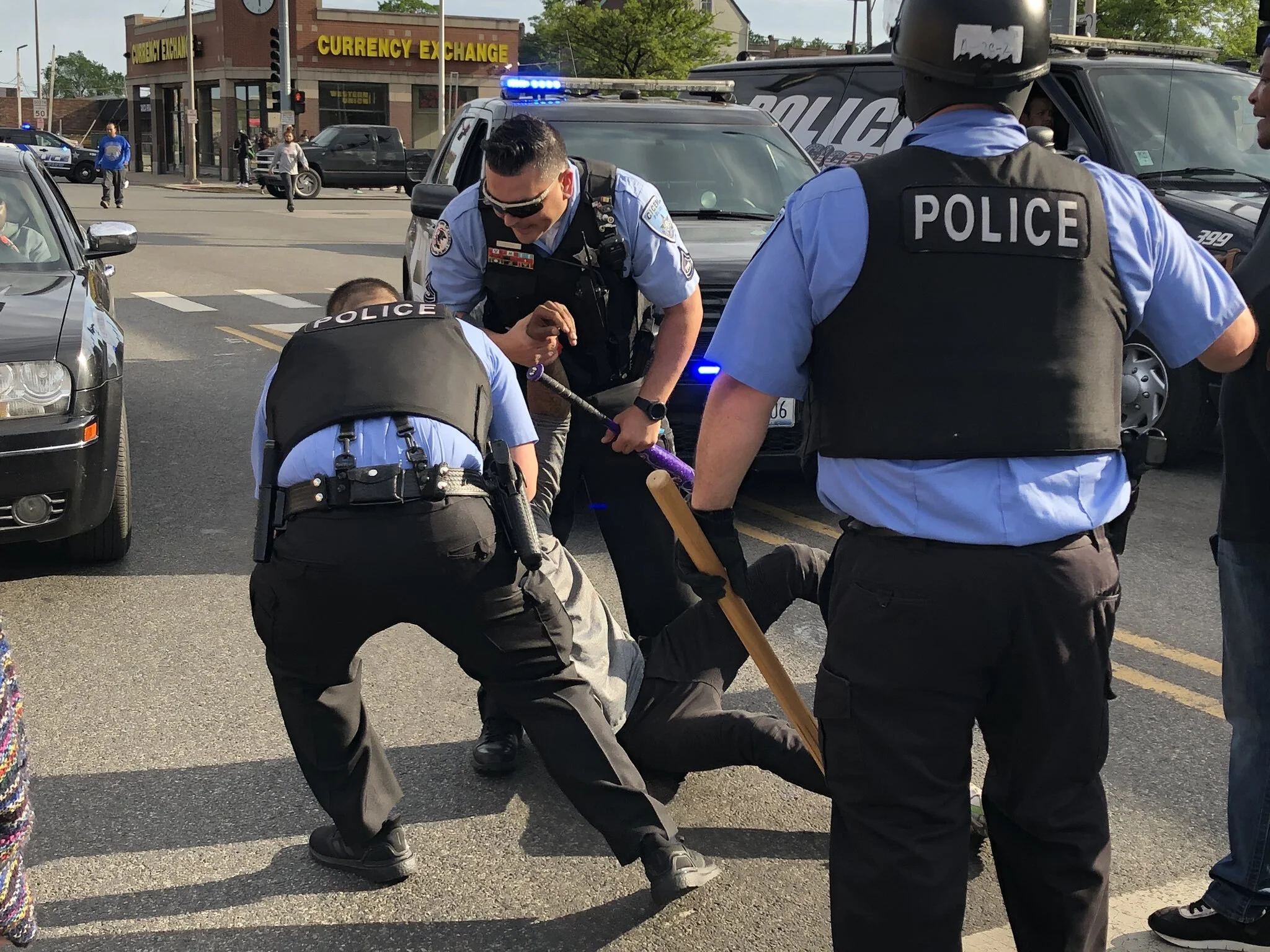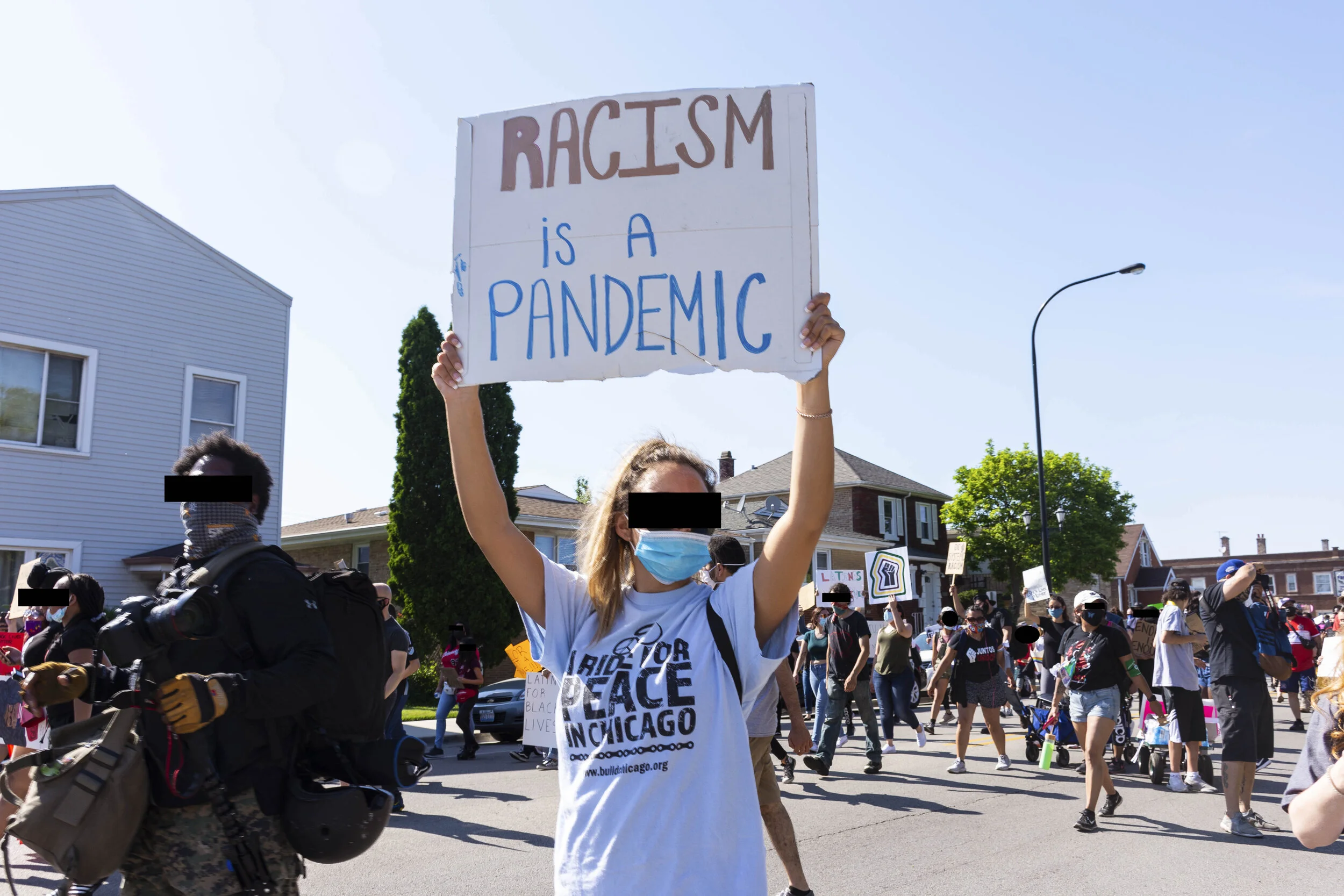"Racism Doesn’t Go Away With One March"
On June 7th, 2020 a Solidarity with Black Lives Matter Cicero Berwyn Walk was organized in response to the social unrest that unfolded on June 1st, 2020 in Cicero. (Photo by Jesus M. Montero)
On Sunday, June 7, a group of seven Cicero residents “who have lineages in Mexico, El Salvador, Honduras, and Guatemala...comprised of men, women, trans and non-binary folks,” organized a “Solidarity with Black Lives Matter Cicero Berwyn Walk.” The march was a direct response to the social unrest that unfolded on June 1 in Cicero.
Taken in Cicero, IL by Jonathan Aguilar
After reports of property damage in Berwyn and Cicero on May 31 and as threats of continued unrest surfaced on social media, non-Black Latinx residents armed themselves with bats, wooden planks, rocks and bricks and stood on corners throughout the town protecting properties, as they claimed. Black and non-Black residents likened the groups to vigilante mobs that targeted Black people living in and driving through Cicero.
Julissa Cortez and Leslie Cortez are two sisters from Cicero who talked to Cicero Independiente about the events that led up to the march, the significance of the event and future plans for anti-racist organizing in Cicero.
As told to Irene Romulo
Julissa Cortez
“We decided to do this march [in Cicero and Berwyn] because on Monday June 1 we went to a march from the 1st precinct [in Chicago] to Lincoln Park and it was so beautiful, it was so peaceful. It unified us.
I didn’t realize that Cicero was doing any protests so my sister and I went to march in Chicago because that’s where we were hearing that they needed support. These marches are primarily led by Black youth and we don’t want them to be arrested or harassed by the police so we were there to support them.
I think it was like 6 p.m. when we were coming back home in our Uber. We were on Roosevelt Road and it was awful. There were people out in the streets [of Cicero] on the corner watching cars, drinking their beer, with their bats, wooden planks. All these men just out here and kids watching. It was just really scary to see our community be like that and then we saw Facebook Live videos of Black people getting removed from their car or rocks being thrown at them and it was just horrifying to see that what we just marched for [in Chicago] was completely different from what Cicero was doing.
On June 1, 2020, armed men stand on the roof of the Dollar Buster $ on Cermak Road and Laramie Avenue. An armored vehicle drives past the store on Cermak Road. (Photo by Ankur Singh)
Militarizing our community provokes the worst image in people's heads. When we were trying to get into Cicero we had difficulty because a military truck was preventing us from entering.
A lot of people who apply to the Cicero Police Department are good people but they work for a system that oppresses others. I’m sure there’s good cops there but they are working for the wrong job. I feel like a lot of people don’t want to defund the police because they know good cops but they don’t understand the systematic racism and oppression that these organizations have.
My grandmother is bipolar. When her cases get really bad we only have the police to call. My grandmother has been tased by the police so it's like, why are they being violent with this woman? They do not have training to deal with people during a mental health crisis.
There's a lot of people in Cicero who also have these experiences, who have these health conditions and the only resources we have to call are the police and they are not equipped to deal with that. If we defunded the police and created another number that we could reach when people are having an episode that could actually address the situation, like a mental health service, they would be far more likely to not hurt my grandmother.
On June 7, 2020, Cicero and Berwyn residents came together for a "Solidarity with Black Lives Matter" walk. At one point, people marched along 26th Street from Laramie to Ridgeland Avenue where the group turned north. (Photo by April Alonso)
So we wanted to organize the march but we [non-Black Latinx residents] did not want to lead it. This was just for us to create a platform for Black voices, Afro-Latinx voices to just speak.
We wanted to tell our neighbors, ‘Hey Cicero has done this [violence against Black people] before. Not us, but still the same we were capable of doing that.’ We were trying to educate people in our community. This history happened before and we’re trying to prevent this. Let's learn about Black Lives Matter and understand what they are fighting for and see how we can be better allies. We’re not each other's enemies, we're each other’s allies in this. Trying to teach our community about anti-Blackness and how to unlearn racism was the goal for this event. This march isn’t the end, we’re not planning to stop because racism doesn’t go away with one march.
The march was really nice because we went through the community. When we opened up a circle on Lombard and Cermak we wanted to finish the march by giving Black folks a safe space to speak about their experiences and what they want. Whatever message they wanted to talk about.
During the "Solidarity with Black Lives Matter" walk on June 7, 2020, marchers stop at 25th Street and Laramie Avenue to hear a Black resident speak. A march organizer also acknowledge this site as the area where Jerome Huey, a Black teenager, was murdered by a mob of white men in Cicero in 1966. (Photo by Jesus J. Montero)
I think it allowed our community an opportunity to understand that what we were doing on Monday wasn’t what unity is. I think a lot of us understood that our Black neighbors here don't feel safe and these are issues that they actually experience so I think that helped us. I think it was really nice to see people come out and speak and just ask that we shouldn’t be each other's enemies.
That was my favorite part, just sitting down with everyone and just listening. I think that’s the most important thing, we need to listen to the Black community and I don't think we did that before. We were just marching with these chants and we didn’t really get to share their message and I think a lot of us learned a lot that day.”
Leslie Cortez
Leslie Cortez works with youth and has been involved in organizing efforts in the past. She attended several protests in Chicago where her main goal was to ensure that youth were okay and not being brutalized by police. Cortez was part of the team that organized the June 7 march in Cicero and Berwyn.
“I went to a training right before that protest and it was a call to action. It was just like, this is what Black Lives Matter is about, this is how we need to show up as white and Brown folk. Black people shouldn’t be spearheading every single time, this is a system that we all participate in and it is our duty to make sure that we are putting in our part and taking accountability for ourselves and our families. When I heard that and I was meeting some of the young activists who were doing the marches, they were much younger than me and I was just like, they have so much courage like what is stopping me?
Bystanders in front of an ice cream shop on 26th Street express support for the June 7th "Solidarity with Black Lives Matter" marchers. (Photo by April Alonso)
So I told myself I was going to take the whole week off and dedicate myself to assisting with any movements that were around.
The police have a history of targeting people who are non-white, who are not gender conforming, who they consider ‘deviant’ and so for me it’s important to show up and make sure that I’m helping and using my privilege to speak out against them. If my Black friends or queer friends or anyone considered ‘deviant’ is targeted, I feel like it was my duty to help because I felt like wasn’t doing enough. If there’s a time to show up it's now.
[In Cicero] I imagine some folks may have mixed immigration status and the Trump administration has been working hard to denaturalize folks so I feel like it’s really hard, even if folks wanted to get involved on Monday [June 1] like what if they had mixed status and they just didn’t want to get involved with police for fear of possible deportation from contact with police. I feel like there’s another layer of complexity added to this too. I think a privilege that could have been used here— I think one thing that could have been done is more folks talking to the police. Especially if they have family who are in the police, calling them, texting them and folks involved in the Town of Cicero especially the leadership and administration and letting them know that they weren’t handling things right and asking them what is going on.
We called the police and we told them you need to tell people to go home. They were like yeah, we’ll see what we can do, we’ll get someone out there.
I think one advice I can give is to just continue having conversations with parents, I know it is hard and is very difficult because all of us have different family dynamics. If you feel safe enough to have those conversations with your parents please engage them with gentleness and kindness. This isn’t a one conversation, this is something that takes a long time to unlearn.”
Irene Romulo is co-founder and editor for Cicero Independiente.















